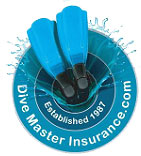Safely Unlocking the Ocean's Treasures

This article on safe diving was provided by the United States Marine Corps.
Scuba diving is one of the safer recreational sports around due to low fatalities and injuries. Despite its safe reputation, there are still important measures that should be taken in order to prevent diving accidents.
Out of the estimated 2 million U.S. citizens that scuba dive, there are approximately 100 deaths that occur every year while diving. Most of these resulted from medical problems, panic and exhaustion, environmental accidents and equipment failure.
Approximately 40 percent of those deaths resulted from medical complications that occurred while diving.
According to Petty Officer 1st class Robert B. Bentley, corpsman, Evans Medical Clinic, U.S. Naval Hospital, Okinawa, one of the first, and probably the most important things to do, is get a medical checkup before going diving, especially if the individual has never dived before or has not dived for a long period of time.
"A good bill of health is important to establish before venturing off in to the aquatic worlds," Bentley said.
According to Bentley, a medical checkup is important for various reasons.
"When an individual comes in for a pre-dive screening, the things we usually check for are any preexisting medical conditions such as respiratory, middle-ear infections or anything indicating that the person cannot perform well in a diving environment," Bentley said.
According to Roy Miller, certified dive master and member of the Professional Divers Association of Diving Instructors, panic and exhaustion are the next most common causes of diving fatalities.
During diving it is important to maintain location of the dive boat. Diving along the anchor line will prevent disorientation, which could result in panic. Environmental conditions like diving in open water with strong currents requires responding accordingly to the particular type of current. For example, rip currents are strong narrow surface currents flowing outward from the shore which results from the return flow of waves and wind-driven water. When a diver is caught in this type of current, while buoyant, he should swim parallel to the shore to escape the current. "Never fight a current by swimming against it; doing so causes exhaustion," Miller said.
Monitoring air supply is imperative while diving and prevents both panic and exhaustion.
Miller says that most environmental accidents can be avoided by following the advice of an area dive guide. Most dive guides know the water, aquatic wildlife and forecasted weather conditions for the diving area.
"An area dive guide can show a person the do's and don'ts of a dive site," Miller explained. "Their expertise can help save the lives of divers who are not familiar with a particular location."
Equipment failure is another crucial factor in dive accidents. Before a dive trip, the diver should have all equipment checked and serviced by a professional dive shop. A diver should do a gear function check before entering the water. It is important to always dive with a buddy, and each diver should check over the other's gear to see if it is properly fitting and functioning.
"Diving with a buddy is the safest and only way to dive," Miller said.
A diver and his buddy should plan the dive before entering the water. Planning consists of agreeing on which under water hand signals to use to communicate, determining who will lead the dive, entering and exiting locations and reviewing emergency procedures. Direction, depth and length of dive time should also be discussed.
Assessing mental and physical well-being play a major part in safe diving. If a diver does not feel like diving then they should refrain from doing so. Alcohol, smoking and decongestive medication causes dehydration and should be avoided before and after diving. "Scuba diving is generally a safe recreational activity and can remain so by following the basic rules and regulations of diving," Miller professes. "The safer the dive, the more enjoyable the experience."
By Cpl. Krystal N. Leach
Recommended Books for Beginners
- Sport Diving
- The Diving Manual of the British Sub-Aqua Club, Ebury Press, Paperback, 256 pages, (November 1998).
Excellent for beginners.
More details at Amazon.co.uk
- The Diving Manual
- Circle Books, Paperback, 164 pages, (2002).
Another one from the British Sub-Aqua Club. Aimed at those interested in taking up diving, and written with the forthcoming European Diver Training Standards in mind, besides supporting divers following the BSAC system this generic diving manual will also be useful to divers following other training systems.
Available with 30% off from Amazon.co.uk
- Scuba Diving
- Dennis Graver, Human Kinetics, Paperback, 212 pages, (1999).
We haven't read this one, but it has very good reviews. The author was director of training for the Professional Association of Diving Instructors (PADI), designed the PADI modular scuba course and wrote the PADI Dive Manual. During his tenure as director of education for the National Association of Underwater Instructors (NAUI), Graver wrote the NAUI Openwater I Scuba Diver Course Instructor Guide.
More details, and 20% off, at Amazon.co.uk
Over to You
If you would like to comment on this article, or to contribute your diving experiences, please fill in this form. We look forward to hearing from you. (We may use your contribution on this site or in our free newsletter - please let us know if you would rather we didn't.)



